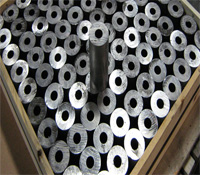Lead Pipe

Characteristics
Seamless pipe made from lead and lead alloys is readily fabricated by extrusion. Because of its corrosion resistance and flexibility, lead pipes find many uses in the chemical industry and in plumbing and water distribution system. Pipe for these applications is made from either chemical lead or 6% antimonial lead.
Lead Pipe and Tube is mainly used in the chemical industries to transport corrosive chemicals. The Lead Pipe is flexible, ductile and seamless fabricated by extrusion. The Lead Tube is also cut and used as sleeves in joining lead sheathed cables. Lead Pipe and Tube is made from quality grade material and can be availed in different specifications to suit industrial requirement.
Lead Seamless Pipes are manufactured from quality lead, these Seamless Pipes are high on strength and finish. Owing to its qualitative features, Lead Seamless Pipes is highly demanded by various chemical industries.
Special Features: Corrosion resistant, High strength, Durable, Optimum quality, Flexible, Ductile, Seamless fabricated by extrusion, Used as sleeves in joining lead sheathed cables.
Applications
- Lead Pipes in Industry
Lead pipes are still used in industry because of the properties of lead that include malleability, flexibility and resistance to corrosion. Typical applications include chemical plants, nuclear plants, paper manufacturing plants and Hydro and plating applications. Lead pipes are used in pulp and paper industry in cooling systems which use sulfur dioxide gases and in transporting the bleaching stock which uses hydrogen peroxide or zinc hydrosulphite and for draining the discharge from the pulp digesters.
Other applications for Lead Pipes are for Soil Waste, Ventilating, and telephone and telegraph underground piping, pressure tubes (copper lead) and cable sheathing.
- Lead Pipe in homes and buildings
Appliances and plumbing fixtures require vent pipes that run through the roof of a house. Lead pipe flashing is installed over vent pipes and incorporated into the shingle pattern to create a cohesive, water-resistant rooftop.
Pipe fabricated from 99.7 percent pig lead; various lead alloys are also still used for drainage. Lead Sleeves and Cones are used with Expansion Bolts for extra heavy loads or for installation in poor masonry materials.
Lead pipes are generally, but not exclusively, used for carrying acids and corrosive chemicals or for sheathing sensitive communication cable runs for waterproofing purposes.
Lead Pipe Pictures
